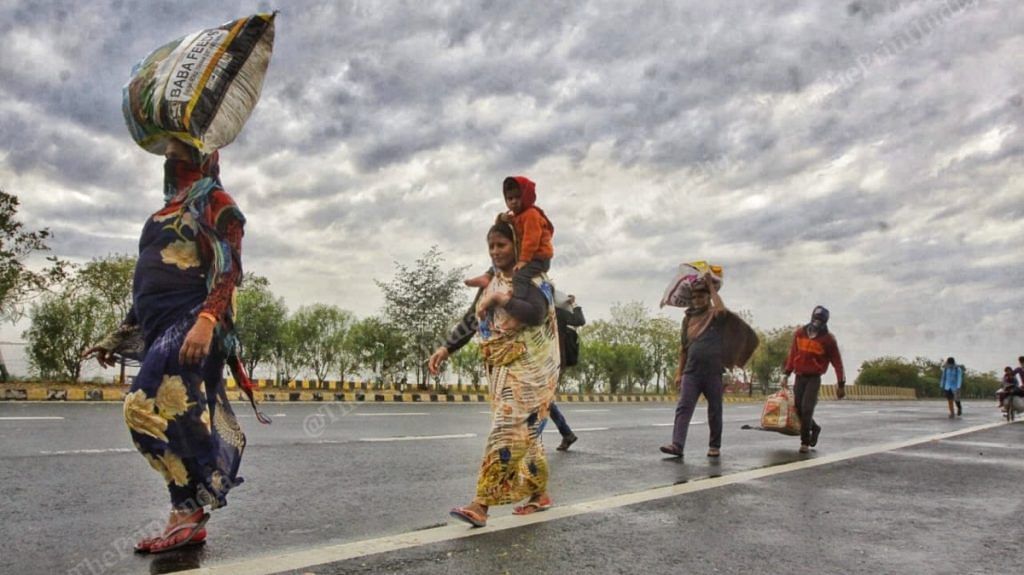New Delhi: Scores of migrant workers continued to leave Delhi-NCR Friday, the third day of the nationwide lockdown announced by Prime Minister Narendra Modi earlier this week.
Most of the daily wagers, who left Delhi-NCR Friday, were the ones who stayed back in the hope of getting food and accommodation from the administration.
But when they didn’t receive any help from the authorities, they started leaving.
Fear of lockdown extension
Union Finance Minister Nirmala Sitharaman Thursday announced an economic package worth Rs 1.7 lakh crore to help migrant workers, labourers, poor and agricultural workers deal with the impact of coronavirus outbreak and the nationwide lockdown.
A large number of daily wage labourers, who spoke to ThePrint, however, expressed the apprehension that if the government has announced relief measures for three months then there’s a chance it could extend the lockdown for the same duration. This apprehension led to more rounds of migration.
“… the government announced yesterday (Thursday) about relief measures for three months, they might as well extend this lockdown for the same period. Then how will we survive till then here?” said Ranveer Singh, 33, who hails from Mainpuri in Uttar Pradesh.
Singh, who worked as a carpenter in Noida, is on his way to Mainpuri, over 300 km away, on foot along with his wife and children, Aditya and Pinki, aged 5 years and 3 years, respectively.
“We were waiting for announcement of transport arrangement from the administration since we can’t stay here due to lack of money and food as we live on the basis of daily income provided by contractors,” Singh told ThePrint.
He said his family didn’t eat anything since morning, except for a few bananas and biscuits.
Also read: Homeless with no income, migrant labourers wish they had left Delhi before the lockdown
Administration & police apathy
According to some migrant workers, police told them to assemble at Pari Chowk in Greater Noida to get free food, travel and medical check-up facilities. But when they went to Pari Chowk, the workers were made to sit on the road dividers and there were no such facilities available.
“We are being made to sit here since morning with promise of help but nothing has arrived so far,” said Rahul Singh, 28, who worked at an eatery in Noida.
He is travelling back to his village in Faizabad, UP, over 600 km from Noida, with eight other people from the same district.
“…our contactor told us to go home without any payment as there was no business anymore,” he told ThePrint.
The local police were clueless as to why the medical, transport and food arrangements didn’t come for the migrant workers.
“We were informed by the higher authorities that there is transportation, food and medical aid coming for these people and we have been instructed to wait for it but nothing has arrived so far,” Dinesh Solanki, in-charge of Pari Chowk police station, told ThePrint.
Spike in food prices hurting people
Some of the daily wage labourers said that even if they have cash and food shops are open, they can’t afford to buy anything due to a sharp spike in prices.
“We had to sell water bottles, utensils to buy food for our children. In the last few days, atta (flour) was sold in Shahberi village in Noida extension at Rs 60-80 per kg and potato for Rs 50 per kg,” said 32-year-old Satish Pasi.
Pasi is traveling back to his hometown in Jhansi, 435 km away from Noida, with his wife, brother, his family and four children.
“We worked as masons on a daily wage basis at various construction sites across Noida but after lockdown all of them denied for payment,” Pasi added.
His family, all of them walking barefoot on Yamuna Expressway, fears that they might exhaust their rations before they reach Jhansi.
Satish’s brother Avinash said: “We have gathered whatever ration was left and will sleep and cook at night wherever we find a support from any village but we have to walk fast as the food is limited.”
“We will try to reach our village anyhow, because here we will anyway die of hunger if not from coronavirus, so it’s better to die with our family,” he told ThePrint.
Slim chance of employment at native places
For most daily wage labourers, heading back to their native places does not guarantee them livelihood.
“We came to Delhi in the first place because our farms were destroyed due to stray cattle who use to eat our crops. So, if we go back to our village, there also we have to work as labourers, but there is no work anywhere,” said Ram Narayan, who is walking back to Mahoba, in Madhya Pradesh, which is 542 km from Noida.
Narayan worked as a construction labourer in Noida.
Man Kumari, who hails from UP’s Hamirpur, which is 449 km away from Noida, said: “There is just 500 rupees left with me and I have to survive with it for the next one week on foot.” She used to work as a maid in various housing societies in Noida.
“I have no specific skills for any work, so I have to work like other manual labourers in brick factories near my village,” she added.
Also read: ‘Easier to survive in village’ — it’s a long journey home for Delhi labourers with no work
